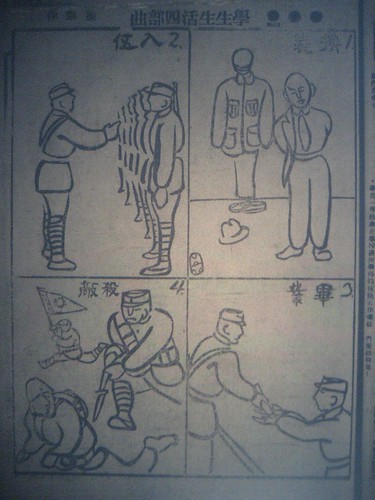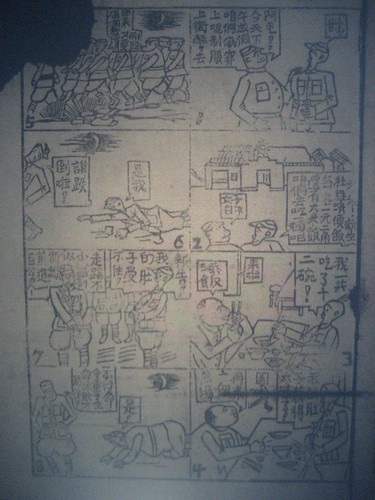While here in Shanghai I have been doing a bit of research. My new project is on 训练 and military training during the War of Resistance Against Japan, and in particular in the activities of Hu Zongnan. Turning ordinary Chinese into soldiers was a big deal during the war, and Hu was in charge of a number of institutions that were supposed to deal with this. Here are a couple of cartoons.1 This first is about joining the army.

You will note that the guy in the first frame (upper right) is wearing a tie, and seems to be a modern-educated middle class type of person. One of the issues for the Nationalist was convincing 青年, which technically means youth, but really means educated youth to join the army. Hu Zongnan’s schools wanted only Upper Middle school grads as cadets, and their goal was to turn idealistic intellectuals into soldiers2 In the lower right the cadets are seen “graduating” and getting a diploma, just like military academy was a proper goal for an educated youth. I am particularly interested in why frame 2 (upper right, the training they got) so seldom led to frame 4 (Lower left, kicking the snot out of the Japanese.)
Some of the problems trainers faced are displayed in this cartoon.

Here a cadet is invited by a comrade to go out to eat, and by frame three (middle right) he is exclaiming that he has eaten twelve bowls of rice. In the next frame he is complaining that his tummy is bothering him, but his friend just orders more soup. Needless to say this causes problems for our hero on the march the next day, and he gets a well-deserved dressing down. This is quite typical of how quite a lot of cadets viewed military training. The point was to do it and get the status of a party cadre and then stuff yourself with food on the nation’s dime. Even the Communists had huge problems with cadres and the banquet culture. You can almost see the Cultural Revolution and Mao’s attempts to turn his party members back to service as a goal rather than banquets and “using the back door.”
“banquet culture”: I hadn’t heard that before.
I think I just made “banquet culture” up, although I may have read it somewhere. It’s more than just banquets, of course, but the whole culture of being a cadre both under the Nationalist and the Communists was all about taking advantage of your position in a million diffent ways. There has been at least some work on this, although it is a pretty diffuse thing.
The phrase really captures something: I’ll credit you unless someone else comes along.
In this regard, it seems like the cadre culture is a direct descendant of the scholar-bureaucrat/mandarin culture.
Thank you. That’s an interesting blog post which I came to via the Military History Carnival #4.
I once thought I had created a nifty turn of phrase, and by Googling it found I was not the first to invent it. If you try “banquet culture” in Google, you’ll find a few others who have had the same light bulb over their head.